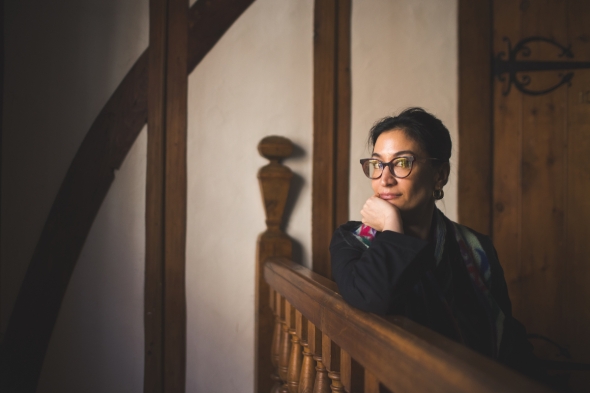

Dubrova received the 2023 Student Translation Award from the American Translators Association. In a Q&A, Dubrova and professor Nirvana Tanoukhi discuss the challenges of translating Ukrainian into English and the spirit of collaboration that permeated the translation process.
Zhenia Dubrova '24, an English major with a concentration in creative writing from eastern Ukraine, received the 2023 Student Translation Award from the American Translators Association.
The award, which is open to both undergraduate and graduate students, was announced at the ATA's annual conference this week.
Dubrova won the award for her translation from Ukrainian into English of Your Beloved Dogs and Other Animals, a poetry collection by Bohdana Matiyash. She began working on the translation last winter in Assistant Professor of English Nirvana Tanoukhi's workshop in literary translation. Dubrova continued the project in an independent study with Tanoukhi, while also taking part in an informal weekly literary translation workshop Tanoukhi led with a group of student translators.

In the award citation, the ATA described Dubrova's translation as "impressive" and "charming," and said that "its quality merits publication."
Dubrova, who is applying to graduate programs in fiction and literary translation, has been in touch with Matiyash about her translation and hopes to find a publisher for the English version of the poetry collection soon.
In a Q&A, Dubrova and Tanoukhi reflect on the challenges of translating Ukrainian into English and the spirit of collaboration that permeated the translation process.
What do you find most challenging about translating Ukrainian into English?
Dubrova: On a technical level, translating this particular poetry collection from Ukrainian was challenging because the poet abstains from any punctuation and uses enjambment in almost every single line. Since I wanted to preserve these features in my translation into English, a language with a much different syntax than Ukrainian, I had to spend a lot of time trying to figure out the word order that makes sense in English, but with syntactical breaks and rhythm that closely resemble the original.
There is also a challenge of confronting readers' expectations when it comes to Ukrainian texts. English-speaking readers have definitely become more interested in reading Ukrainian authors in translation since the start of the full-scale war, but they also largely expect to read a particular kind of text that in some way responds to the recent events and the collective trauma we are experiencing. The text that I chose is drastically different: a poetry collection that came out in Ukraine in 2012, and it has a very different tone and deals with totally different subject matter.
Tanoukhi: Theoretically speaking, there are enough grammatical differences between the two languages to make translating between them difficult. For example, Ukrainian has, in addition to the four cases in English (the nominative, genitive, dative, and accusative), another three: the instrumental, locative, and vocative cases. Also, declension in Ukrainian is more common and various. In practice, however, things are different.
In the act of translation, the literary translator will inevitably be confronted with the lack of, sometimes, indeed with the impossibility, of finding direct equivalence between languages. But it is in those very moments that translation becomes a creative challenge and opportunity.
What led you to translate this particular text, Your Beloved Dogs and Other Animals, a poetry collection by the Ukrainian poet Bohdana Matiyash?
Dubrova: Matiyash is one of my favorite Ukrainian poets, and I always loved this collection. But beyond that, this selection was deliberate because I wanted to translate something that was written and published before the war. These poems are full of hope, love, tenderness, and I think they can challenge the expectations of anglophone readers regarding contemporary Ukrainian writing and the themes it addresses.
I translate a lot of texts about the war for different Ukrainian media and absolutely believe that the trauma, pain, grief, and, at the same time, bravery and resilience of the Ukrainian people should be recorded, translated, and shared as widely as possible. But this doesn't mean we should limit ourselves to such texts. Matiyash is a Ukrainian poet, but there is something universal about her work that has the power to move anyone.
Tanoukhi: When Zhenia took the literary translation workshop last winter, she chose for her first project a psychological short story by the Ukrainian writer M. Khvylovy about the communist rule of Ukraine.
Shortly after that, Russia invaded Ukraine. For her second project, Zhenia translated a collection of Ukrainian poems, some about the war. We ended up spending most of that workshop on two poems, which is not unusual in workshop: one was about the war and the other was one of the Matiyash poems.
I believe that this process helped lead Zhenia to decide on Matiyash's poetry collection for her translation project. Often, an energy builds up in the dialogue between translator and readers in the workshop process, which crystallizes the aesthetic appeal of a work.
How did the translation workshop influence the process of translating Matiyash's poetry?
Tanoukhi: I think that by the end of the workshop, because of the nature of feedback loops in our translation workshop, the investment in getting Matiyash translated became a shared one.
During the following term, half of the workshop participants continued meeting weekly with me in the poetry room of Sanborn Housel—not for any course credit, but just for love of the process. And there, students spent many hours in "informal workshop" quibbling about the smallest details of Matiyash's poems and Zhenia's translations.